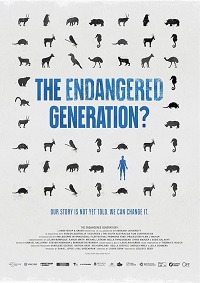THE ENDANGERED GENERATION?
Australia, 2022, 85 minutes, Colour.
Narrated by Laura Dern.
Directed by Celeste Geer.
The Endangered Generation?
Official Summary: Combining modern science with ancient First Nations knowledge, The Endangered Generation? seeks new ways of thinking about the many crises facing our planet. Our world is at a crossroads of myriad crises, but all too often the solutions to the problems we face - especially vis-a-vis climate change - are put in the "too hard" basket. But, as director Celeste Geer discovers, it doesn't have to be this way. Following Then the Wind Changed, her Walkley Award-winning film about rebuilding after the 2009 Black Saturday bushfires, she seeks answers to the question of why, after decades of warnings, we continue to shirk the necessary measures that will prevent all-out climate catastrophe. The Endangered Generation? aims to remove roadblocks to change by presenting new and hopeful angles on the tasks required. In the lead-up to COP26, Geer met with scientists, First Nations leaders and communities from around the globe who, through their research and experiences, are showing how collaboration, imagination and creativity - in particular, Indigenous knowledge systems - will likely be the most effective tools for surviving the world we now find ourselves in. A moving, and at times surprisingly joyous, exploration of who we are and how we relate to the environment, the film reveals not just a potential salvation for humanity but a salve for the anxieties and uncertainties of modern life.
This is an Australian production, with backing from Monash University and other institutions. Some sequences were filmed in Australia, with acknowledgement of First Nations and their traditions, and speakers. The film opens in Panama, an emphasis given to that country, its status as carbon-free, focus on its First Nations people, their aspirations, the talent in weaving – and the presentation by the delegate to COP 26, Glasgow, 2021, making a strong impression, as well is the presentation of the weeping.
Filming was also done in Indonesia as well is in Antarctica.
This is one of many documentaries with a sense of urgency for tackling global climate issues. However, while a lot of the material continues to be urgent, the ending is somewhat dated with its taking place at COP 26 in Glasgow, with Boris Johnson, soon losing his prime ministership, as host.
The advantage of this kind of documentary is that it can be available to a wide audience, streaming, television, and available for groups discussing issues as well as providing background and information.
While it has a cumulative effect, it may well be more effective if shown in sections with discussion afterwards, some of the key speakers who communicate with strength and conviction, and some of the beauty of visuals as well as tragic changes around the world.
One of the difficulties is that it raises the question of whether films like this are preaching to the converted and whether they have opportunity for reaching a wider audience. One hopes so.